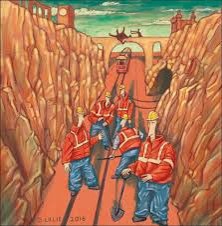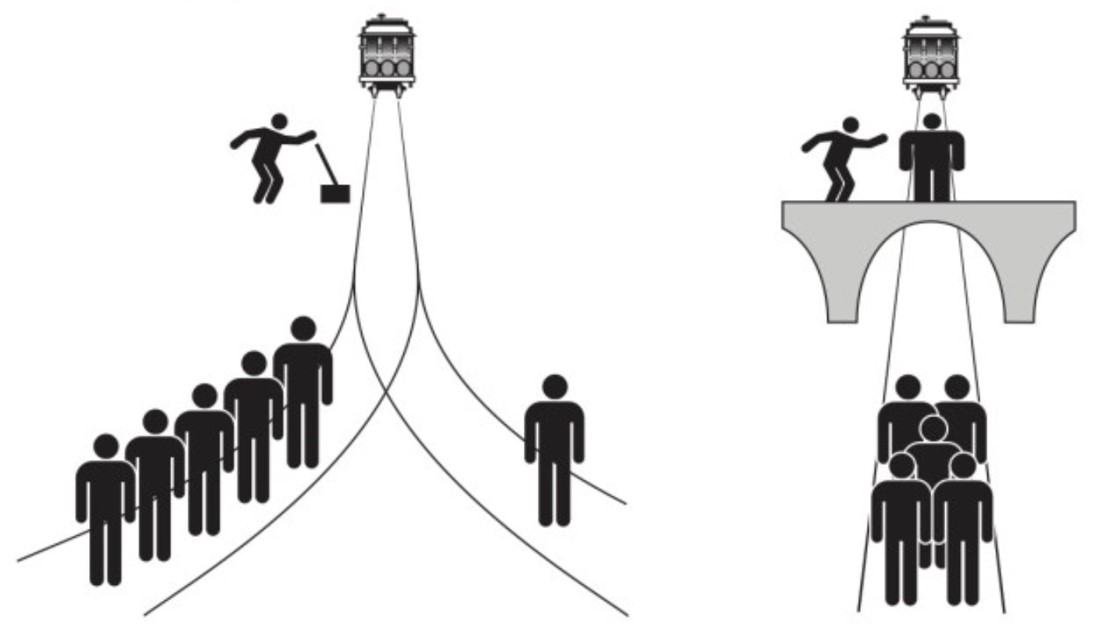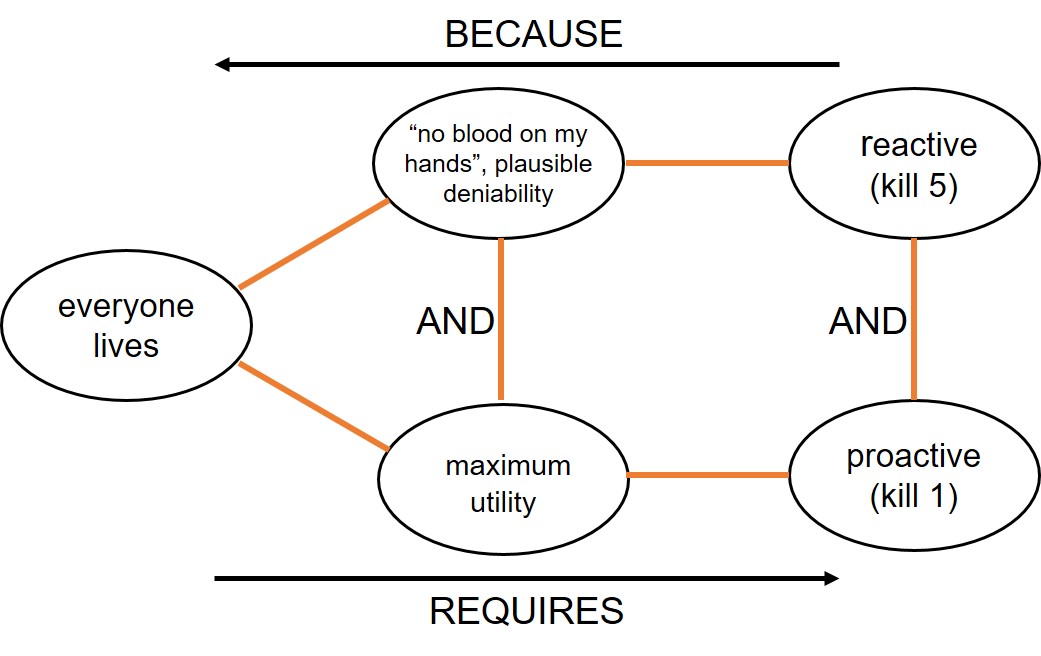A few months ago, when I inadvertently revealed to a friend that I’d run out of useful non-fiction to read, I was pointed in the direction of philosophy books. Wow. What a sad, sorry journey that’s turned out to be. At least from a TRIZ perspective. If only this philosopher knew about TRIZ, I kept saying to myself, they wouldn’t keep saying such dumb stuff. Dumb trade-off stuff. I’m-right-you’re-wrong kind of stuff. It was like being back in Debating Society. A very bad version of Debating Society where everyone is stuck in an infinite loop. One full of all the people that ended up becoming politicians.
Plus, now I can’t get the idea of a Third-Way politics out of my head (see previous blog article), it feels like the Philosophy Departments have a lot to answer for. Especially in terms of the mess the career-politicians and ‘swamp-draining’ political disruptors seem to be making of things right now. Why can’t they see that the right answer to any kind of debate is not ‘I win’ or ‘you win’ or ‘let’s meet in some kind of please-nobody halfway point’.
Think about any of the big political arguments these days and it ought to take no more than five minutes to work out that the halfway compromise is never going to appease anyone. Whether it’s pro-life-versus-pro-choice or Brexit-versus-Bremain, or ‘alt-left’-versus-‘alt-right’, the answer is never going to come by trying to find a point at any kind of magical intermediate point between the two extremes. In the same way that you can’t cross a chasm in two jumps, you can’t solve a dilemma problem by building a rope bridge and expecting everyone to go and stand in the middle.
Last week I hit upon what has started to feel like some kind of root (-contradiction) to why the politicians and philosophers are floundering so badly. What I hit upon was the ‘trolley problem’. One of those morality tales Debating Societies seem to love getting their teeth into. Seemingly for ever, if evidence from around the Internet is anything to go by.
Just in case you don’t know what it is, the scenario involves a runaway trolley car. The car is trundling along the track which, as only philosophers with too much time on their hands and too little common-sense would configure, has five people tied to the rails. When the trolley hits the five, they will all die. Sad.
Fortunately, as luck would have it, you’re standing by a switch that, should you pull it, will divert the trolley off on another track, thus saving the five people. The only problem is that, on this new bit of track, there’s another person tied to the rail. Thus, pulling the switch to save the five people will cause the death of one. The deep philosophical question then being, ‘would you pull the switch?’
Not satisfied with this apparently dubious scenario, several new variants of the problem have subsequently appeared. One of the more interesting ones sees you on top of a bridge running over the top of the trolley track next to a person wearing a heavy back-pack. By pushing this person over the bridge onto the track, you’re able to save the five people tied to the track, but sadly, kill this poor unfortunate, back-pack toting stranger. Again, the question is, would you do the deed?
Now, when I declare this variant of the trolley problem ‘interesting’ what I mean is that when lots of people are surveyed about the two questions, a lot more people (just over double the number) would push the switch than would push the person with the back-pack off the bridge. This is interesting, I think, because it helps us to reveal the real problem. Sadly, the philosophers don’t see things through to this next stage. All they seem to be interested in is tackling the problem as an optimization challenge. They’re caught, in other words, in the usual either/or trap Socrates taught them to think about.
Seeing the problem as an either/or situation allows the philosophers to identify two kinds of people: Utilitarians – people who make a tangible value calculation that concludes saving five lives is better than one – or Deontologists – people who take the categorical moral imperative stance that prevents them from partaking of an action that causes harm to others.
Drawing a line between Utilitarians and Deontologists and measuring where people are along the spectrum is frankly a dumb waste of time. Both for the people being asked and the even dumber people designing the experiments in the first place.
It’s a contradiction, stupid.
If you wanted to really solve the problem, what you ought to do is draw a picture that looks something like this:
Then, you can look at the TRIZ Contradiction Matrix and see how others have been there before you and actually solved the contradiction.
Which, if I look the trolley problem up as a technical problem seems to most likely be solved using Principles 28, 7, 19 or 24. Or, if you treated the problem as a ‘people’/’psychology’ problem, you’d start by looking at Principles 7, 2, 24 or 10.
Using one or a combination of those strategies, should give a dozen ‘third-way’ solution options.
I could write a bunch of them down for you, but I know that the philosophers and politicians would tend to think of all of them as ‘cheating’. What they mean when I experience these kinds of people using this word is, ‘stop being creative and answer the damn question: are you going to push the dude off the bridge or not?’
And thinking about those annoying kinds of situation, it suddenly hit me what ‘third way’ means at a much more general level. And how people actually think. Or at least how designers think. Or rather, how people that haven’t been infected by terminal either/or- disease think.
Pose the trolley problem to a designer and they won’t see it as a utilitarian value trade-off between saving five people or saving one. What they rather do is think about the ideal outcome. In this case the ideal being that no-one of the six people dies. Then, having defined where the solution needs to get to, they start to think creatively about how that ideal outcome might be achieved. They’ll look for resources, and any damn way possible to ensure everyone walks away alive.
If that’s ‘cheating’ then so be it. That’s what creativity and innovation is all about. Breaking rules to find better rules. It’s a way of thinking fundamentally different to the ones the philosophers and politicians have been taught to use.
One that, if we give ourselves permission to use it, allows us to stop spinning the wheels for the next three hundred years pointlessly debating Utilitarianism versus Deontologicalism, we can all move on to more interesting problems. Ones that solve the contradiction. And the next one. And the one after that.
‘Third-way’ thinking means not meeting halfway, but rather somewhere else. Somewhere where we get a much more ideal solution. One in which everyone is and feels better off than they were before.
I have a feeling that deep-down we all naturally think in this idealistic way. At least that’s how we start. We naturally look for ideal solutions. And it’s only when apparently smart people – like the philosophers and politicians – bludgeon us into thinking we have to make trade-offs and that we ‘can’t cheat’ that we end up dropping ourselves to their meaningless, pointless, no-skin-in-the-game level. No-one actually dies in the trolley problem. I know that if it was a real situation and someone was actually going to lose their life, I’d put my faith in the person who was more than happy to think (‘cheat’) their way out of the either/or trap and make sure we ended up with everyone still alive at the end of the story. Cogito ergo tertium. I think, therefore I find the third way.



